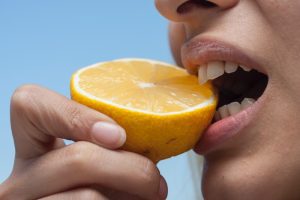Good for the gut doesn’t always mean terrific for the teeth.
And it’s not only the Sour Patch Kids and Dr. Pepper to watch out for when protecting your teeth. All foods and drinks that are highly acidic have the potential to cause erosion. Erosion is the process that wears away your enamel, which you need to protect your teeth.
Acidity doesn’t only occur due to sugar. It has to do with PH levels. According to USGS, the PH scale ranges from 0 to 14. This scale measures the acidity and alkalinity levels of a substance. It is used to measure the pH balance in foods, drinks, and even a person’s saliva.
- Substances that fall below 7 pH are considered acidic
- Substances that are above 7 pH are considered alkaline
When you’re not consuming food or drinks, your saliva should be in a neutral range of 6.5 to 7.5 pH. Staying at this range will prevent erosion and tooth decay. If your saliva is highly acidic, then that may mean you’re consuming too many acidic foods.

(Engin Akyurt/unsplash)
Highly Acidic Foods/Drinks
Some acidic foods are healthy for your body but should be consumed in moderation for the good of your teeth. Here’s a list of highly acidic foods/drinks to be mindful of:
- Anything citrus (lemons, oranges, limes, grapefruits, tangerines)
- Apples, grapes, peaches
- Pomegranates, blueberries, pineapples
- Tomato
- Jam/jelly
- Vinegar
- Fruit juices
- Soda
- Sauerkraut
- Alcohol
Healthy Foods that are not acidic:
- Beans
- Cheese
- Bananas, mangoes, papayas
- Watermelon, cantaloupe, honeydew
- Yams, potato, rice
- Green tea
- Bread
- Tofu
- Salmon, shrimp, crab meat
- Corn, peas, peppers, asparagus, spinach, broccoli
Signs of Dental Erosion
According to the ADA, dental erosion is “the chemical loss of mineralized tooth substance caused by exposure to acids not derived from oral bacteria.” Excessively consuming those acidic fruits and sipping on your favorite fruit juice can mean bad news for your tooth enamel. Highly acidic substances can slowly cause your tooth enamel to weaken and demineralize.
Your saliva’s calcium is supposed to contribute to strengthening your enamel, but saliva that is too acidic does not do its job. Common signs of tooth erosion include:
- Sensitivity to hot or cold foods/drinks
- Cracks
- Rounded teeth
- Transparency in the teeth
- Discoloration
How to Prevent Erosion
We’re not telling you to stay clear of your favorite fruits! We know how important a well-balanced diet full of fruits and veggies is for your diet. Vitamin C is important for your health. It’s just good to be mindful of the foods that may affect your teeth more than others. Here are some tips for enjoying your favorite acidic foods while protecting your teeth.
- Don’t suck on acidic fruit
- Use a straw for drinking juice to keep it from touching your teeth directly
- Do a water rinse in your mouth after eating sour fruit
- Brush with fluoride toothpaste
- Snack on cheese after fruit to neutralize the acids
The Effects of Alcohol on the Teeth
Like acidic foods, you should consume alcohol in moderation for the good of your teeth. If you stick to one drink daily, your teeth will most likely be fine. However, excess amounts of alcohol can be a nightmare for your teeth. Too much alcohol can lead to high amounts of plaque on the teeth, increased risk of periodontal disease, tooth decay, tooth loss, mouth sores, and even a higher chance of oral cancer. Here are three reasons why alcohol is bad for your teeth.
1. Dry Mouth & Dehydration
Is there anything worse than a constant dry mouth and the sluggish feeling of dehydration? Alcohol can reduce saliva flow and cause a parched mouth. This raises the risk of tooth decay and gum disease. Saliva plays a vital role in oral health as it washes away bacteria.
A dry mouth also leads to bad breath, and nobody wants that. Make sure to balance your alcohol consumption by drinking a lot of water to replenish the saliva. Sugar-free gum can help replenish saliva too.
2. High Sugar Content
Bacteria in the mouth thrive on sugar. So, sugary alcoholic drinks can lead to more bacteria in the mouth. The unwanted bacteria form an acid that eats away at your teeth, which weakens the enamel and causes dreaded tooth decay. One way to prevent bacteria from alcoholic drinks is by choosing alcohol with less sugar, such as dry wine.
3. Teeth Stains
Some alcoholic beverages have deep hues that can stain your teeth and cause long-term discoloration to your teeth. Drinks like Sangria and red wine can turn your teeth red. Discoloration while drinking can be avoided by snacking on non-acidic food while you drink and chewing sugar-free gum to replenish your saliva.
Tooth health is essential, and what we put into our bodies often impacts our pearly whites. Be mindful, keep the acidic foods and alcoholic drinks in moderation, go to your Kaysville family dentist for routine check-ups every six months, and brush and floss daily. Forming healthy daily habits is essential in keeping your teeth healthy, strong, and beautiful!
